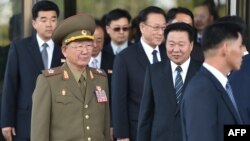A high-ranking North Korean delegation’s recent visit to South Korea has experts speculating about Pyongyang’s motives behind the rare move.
In a surprise move, three high-level North Korean officials visited South Korea last Saturday for the closing ceremonies of the Asian Games in Incheon.
The North’s No. 2 man, Hwang Pyong So, director of the Korean People’s Army General Political Department, led the delegation. Ruling party members Cho Ryong Hae and Kim Yang Gon joined him on this trip.
In a telephone interview with the VOA Korean service, Joel Wit, a visiting fellow with the U.S.-Korea Institute at The Johns Hopkins University, said Pyongyang may be reaching out because he believes its relations with China, its biggest ally, are souring.
“This is in line with what North Korea has been doing lately, which is sort of reaching out to countries other than China,” Wit said. He added that Pyongyang had been trying to connect with Japan and Russia even before sending the delegation to South Korea.
Unannounced delegation
The surprise manner of the visit, which was only announced the day before, is a major reason many experts view the North’s intentions in a negative light. Over the years, the Hermit Kingdom has repeatedly shown dramatic moves that seem intended to puzzle the international community.
“I think the reason for this particular [visit] was to confuse the international opinion,” said David Straub, associate director of the Korean Studies Program at Stanford University’s Asia-Pacific Research Center.
Straub said North Korean leader Kim Jong Un is trying to divert the international community’s focus on its human rights abuses and nuclear activities to something that the North can boast about.
He added the 31-year-old head of state has a soft spot for sports and that the visit could have been used as a way to highlight its achievements during this year’s Incheon Asian Games.
“The North Korean athletes did relatively well [at the 2014 Asian Games,] coming in seventh in terms of medals,” said Straub.
Not everyone is pessimistic about what may be a slight shift in the North’s foreign policy.
Professor Charles Armstrong of Columbia University said such change is worth noting.
“They have been much more visible recently. They sent [their] foreign minister to the U.N. in September for the first time in 15 years,” Armstrong explained.
He added while it is unclear whether the visit by itself will lead to improved relations between the two Koreas, it could be a start. Other North Korea watchers agreed.
Straub with Stanford University said South Korean President Park Geun-hye’s decision to welcome the North Korean delegation and subsequently agreeing to resume high-level talks between the two Koreas was the right decision.
Seeking sanctions relief
Lawrence Korb, senior fellow at the Center for American Progress said, the two Koreas differ on what they want to bring to the discussion table at the upcoming talks.
“Basically, [North Korea is] trying to see if they can re-establish economic relations with South Korea,” said Korb.
Pyongyang has been demanding the lifting of the so-called May 24 sanctions imposed by Seoul in 2010. The sanctions followed the sinking of a South Korean naval ship in waters near the disputed western sea border.
The sanctions ban nearly all inter-Korean economic activities except those inside the Kaesong Industrial Complex.
South Korea, for its part, has said it will place the reunion of families separated by the Korean War as its top priority at the upcoming talks with the North.
While Korb says he expects the South to use the opportunity to discuss more issues than the re-establishment of economic ties, others say they believe the situation is not yet ripe for a comprehensive discussion between the two.
Jee Abbey Lee contributed to this report, which was produced in collaboration with the VOA Korean service.




